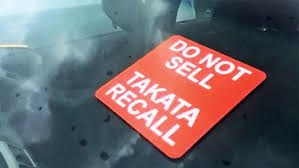Takata – Criminal Airbag Scheme and Innocent Consumer Harm (Part II of III)
 In my continuing review of corporate misconduct in the automobile industry, today we examine the Takata Corporation scandal for its airbag scheme.
In my continuing review of corporate misconduct in the automobile industry, today we examine the Takata Corporation scandal for its airbag scheme.
Takata is a manufacturer and supplier of automotive safety equipment. It agreed to plead guilty to wire fraud and pay $1 billion in criminal penalties for its long-time scheme to sell defective airbag inflators. At the same time, the Justice Department announced the indictment of three Takata executives for fraud and conspiracy for their roles in the illegal scheme. These executives are unlikely to be extradited from Japan to the United States. A corporate monitor was also imposed for a three (3) year term.
From 2000 until 2015, Takata sold airbag inflators using ammonium nitrate as the primary propellant. Takata quickly learned that certain inflators were not meeting specifications from automobile manufacturers, and that certain inflators failed or ruptured. Nonetheless, Takata submitted false and fraudulent reports to conceal the true performance of the inflators.
Takata earned over a billion dollars in revenue from the sale of tens of millions of airbag inflators. According to press reports, 16 people were killed as a result of the airbag malfunctions, and 11 of the deaths occurred in the United States. Approximately 180 people were injured in the United States as a direct result of the defective airbag inflators.
Takata executives were aware of and discussed the malfunction issues, and on numerous occasions directed that the data be fixed and that the reports include false data to meet testing specifications. Even after Takata executives and officers learned that the airbags were resulting in injuries and death, Takata executives and continued to mislead customers about the performance of the airbags.
As early as 2009, Takata learned about the ongoing scheme and failed to take any action to cease the conduct or discipline any executives who were involved. In fact, the executives were promoted to more senior positions in the company. Three Takata executives were indicted and charged with a conspiracy to commit wire fraud and give counts of wire fraud.
Takata had a compliance program, although it appears to have been minimal. The program included a senior executive compliance committee and a hotline for reporting employee concerns. Similar to the VW case, engineers and employees raised internal concerns about the false test data being provided to auto manufacturers. Despite these internal concerns being raised, Takata took no actions and the three executives who oversaw the scheme blithely continued to change test data and submit false reports to auto customers.
DOJ cited the failure of Takata’s compliance program to identify or detect the false reporting scheme and to respond to internal concerns being raised about the false data provided to car manufacturers.
 DOJ estimated that more than 60 million defective airbag inflators were installed in roughly 42 million US automobiles. Takata is recalling the defective products but such recall is not expected to be completed until 2019.
DOJ estimated that more than 60 million defective airbag inflators were installed in roughly 42 million US automobiles. Takata is recalling the defective products but such recall is not expected to be completed until 2019.
Just like the GM and Toyota prosecutions and settlements, corporate misconduct committed at the highest levels of an auto industry company resulted in injuries and death to innocent consumers. Compliance failures resulting in financial misconduct are one thing but ineffective compliance programs resulting in injury and death to innocent consumers is another category of misconduct.















2 Responses
[…] Read Full Article: Takata – Criminal Airbag Scheme and Innocent Consumer Harm (Part II of III) – Corruption, Cr… […]
[…] Read Full Article: Takata – Criminal Airbag Scheme and Innocent Consumer Harm (Part II of III) – Corruption… […]